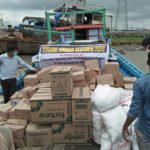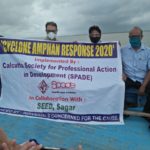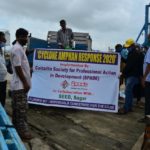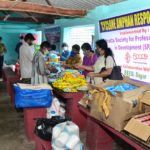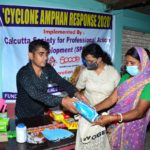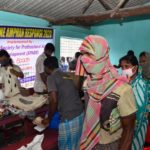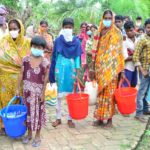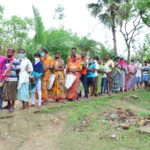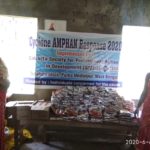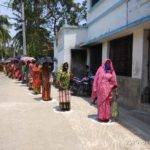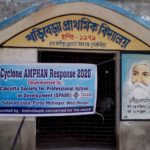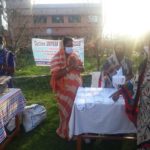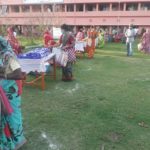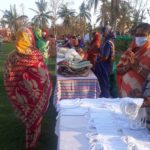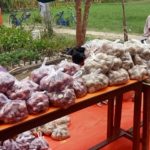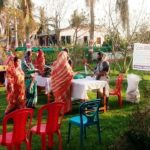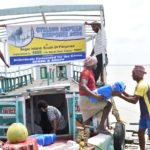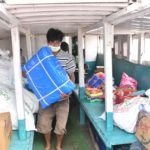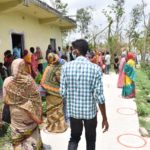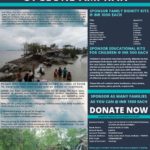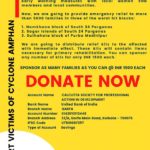The Wrath of Amphan
On May 2020 Amphan hit Kolkata and West Bengal with a fury that far exceeded the ferocity of 2009 cyclone Aila. Apparently Amphan was the worst storm in over a century. As the storm flattened homes, trees and electric posts, flooded villages and swept away roads and bridges, people who were facing the Covid pandemic for over two months reached a point of ultimate crisis.
Covid had already crippled the economy, taken away hundreds and thousands of jobs, created food shortage and price hikes. Fear of infection kept people away from cultivation.
There was a total break-down of all kinds of transport system, so whatever little produce was there was rotting at homes, creating insurmountable hardship. Amphan came as the last straw
on the camel’s back.
Video coverage of relief work done by SPADE
Immediately before the storm, SPADE organisation was working with the government in Namkhana and Sagar Island blocks of South 24 Parganas and Sutahata block of Purba Medinipur. They were busy evacuating people and organising food and shelter, a task made doubly difficult by the threat of Covid. And then came the storm.
Thousands of people got cut off from rest of the world. They had no food, no drinking water, no electricity and no roof over their heads. And the skies were threateningly dark. SPADE decided to go out and help as many as we could. Immediately they developed an appeal and went on Facebook. They also reached out to all of their personal and organizational contacts.
In two days, they raised six lakh rupees. (INR 6,00,000). Self Help Group women members got into action and packed 600 bags of essentials in a kit, each costing 1,000 rupees.
But reaching these packs to people marooned in their villages and homes was a daunting task. It took for them hours of journey by matador vans, boats and then on foot to reach their homes or whatever was left of them.
“We are in the field for the long haul. So our support is not about a one-time help. Currently we are working in the field in association with Maa Sarada Mahila Sangha and PUPA. We are working on the long term needs of the population we cover in the three blocks, assessing need and trying to organize relevant resources. We have been actively engaged in rural development for many years withinternational institutions like Oxfam India, Indo Global Social Services (IGSSS)etc and SPADE looks forward to partner with them in rebuilding the lives of people affected in this crisis.” Indrajit Dutt, Director-Resources, SPADE said.
He added ”Our experience has shown that people want to stand by people in a moment of disaster. It is the job of development organizations like us to communicate that ‘once is not enough’. The impact of Amphan will stay with its victims for years. It will not be easy to rebuild lives. We must be with them and we must be ready to support them regularly. It is not easy as we live our own lives and face our own problems but somehow the impact of the disaster on the memory of people who have not suffered directly needs to be strengthened and kept alive. That is a challenge we have to face. Join our rebuilding effort.SPADE have been with the underprivileged people of Bengal for more than 25 years and to provide relief and to be at their side in critical times is part of our mission. We plan to act farther by rehabilitating them at their place, build up their livelihood, put the schools in order and let the normal lives resume at the earliest”
Press Clippings
শুধু ত্রাণ বিলি নয়, আমফান বিধ্বস্ত এলাকায় স্বাভাবিক জীবন ফেরানোর লড়াই SPADE-এর
আমফানের সতর্কবার্তার পর থেকেই শুরু হয়েছিল কাজ। ভয়াল ঘূর্ণিঝড়ের পর তা আরও গতি পায়। বাংলার উপকূলবর্তী এলাকার দিশেহারা মানুষদের সাহায্যের জন্য ফেসবুকে আবেদন করা হয়। মাত্র দু'দিনেই জোগাড় হয় ছ'লাখ টাকা। তা দিয়েই আমফান বিধ্বস্ত ৬০০ পরিবারের হাতে তুলে দেয় স্বেচ্ছাসেবী সংগঠন স্পেড। আবহাওয়া দফতরের পূর্বাভাস পাওয়ার পরই রাজ্য সরকারের





